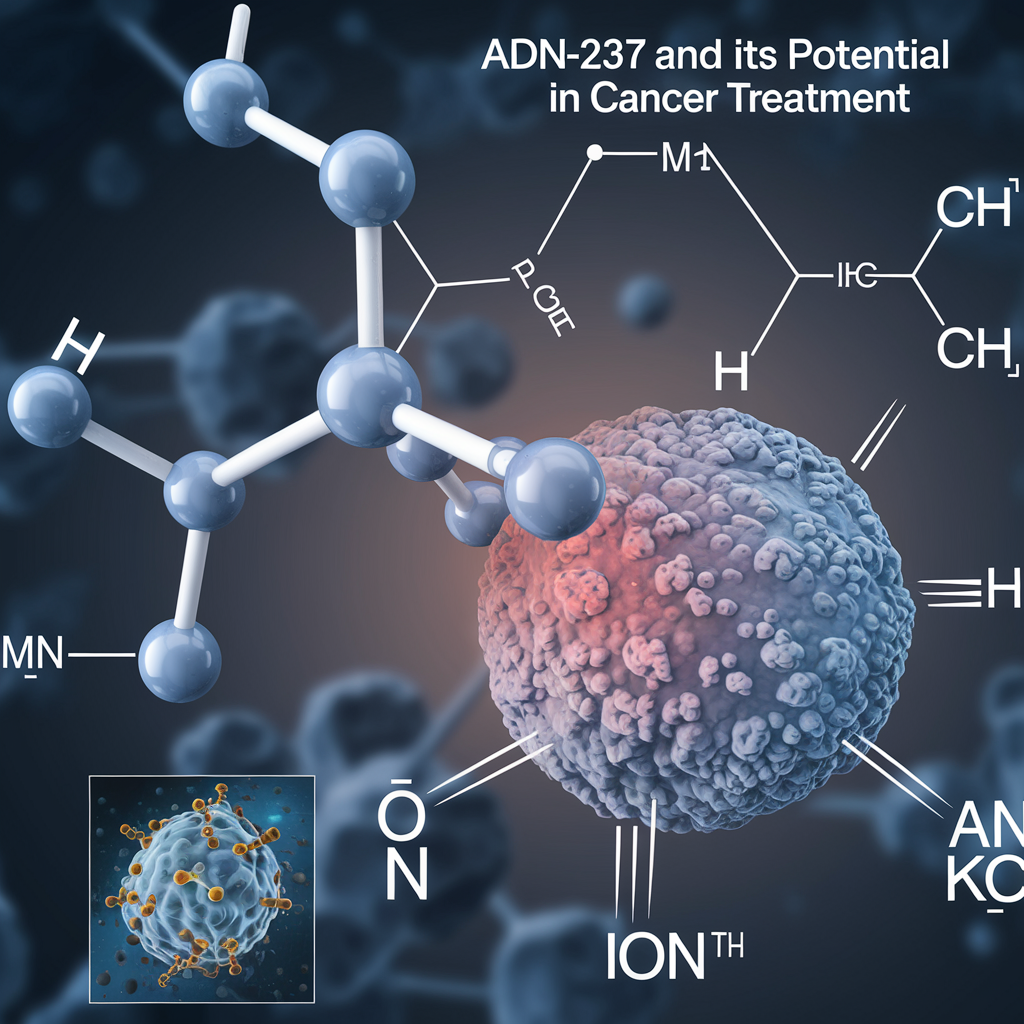ADN-237: Revolutionizing Cancer Treatment and Targeted Therapies

In recent years, the landscape of cancer treatment has evolved with breakthroughs in targeted therapies. Among emerging compounds, ADN-237 has captured the attention of researchers and clinicians for its potential in treating difficult cancers. Offering a pathway for more precise and individualized treatments, ADN-237 may transform how cancer patients respond to therapies and experience recovery. Below, we delve into what makes ADN-237 unique, the science behind it, its role in clinical trials, and the hope it brings to cancer patients worldwide.
Understanding ADN-237
ADN-237 is a novel compound being explored as a promising agent in cancer treatment. Designed to function as a targeted therapy, ADN-237 aims to attack specific cancer cells without harming surrounding healthy cells. This approach is part of a broader movement in oncology, focusing on individualized treatment plans tailored to each patient’s unique cancer profile. By targeting specific molecular markers, ADN-237 has the potential to limit side effects and improve overall treatment efficacy, a goal that has long eluded traditional cancer treatments like chemotherapy.
Why ADN-237 Is Unique in Cancer Treatment
The uniqueness of ADN-237 lies in its mechanism of action. Unlike traditional therapies that target all rapidly dividing cells, ADN-237 homes in on specific cancer cell types, minimizing damage to normal cells. This targeted action not only reduces side effects but also enhances the efficacy of the treatment. Researchers believe that ADN-237 may offer hope where previous therapies have failed, particularly in cases involving resistant forms of cancer.
The Science Behind ADN-237
The mechanism of ADN-237 revolves around its ability to interact with specific molecular targets found on cancer cells. Through binding to these markers, ADN-237 interrupts the signaling pathways that allow cancer cells to grow and proliferate. This targeted inhibition effectively halts cancer progression by stopping cellular replication. Scientists have highlighted the precision of ADN-237 as it disrupts cancer cell pathways without affecting normal cells, thus reducing harmful side effects typically associated with broad-spectrum chemotherapy.
ADN-237 in Clinical Trials: Early Insights
Clinical trials for ADN-237 have generated significant interest within the medical community. Phase I and II trials focus on understanding its safety, dosing, and efficacy in patients with advanced or treatment-resistant cancers. The results thus far have been promising, with many participants showing a positive response to treatment. Safety profiles indicate manageable side effects, suggesting ADN-237 may indeed be an improvement over existing treatment options.
Potential Benefits of ADN-237 for Cancer Patients
The benefits of ADN-237 extend beyond its targeted approach. Early data suggests the following advantages for cancer patients:
- Reduced Side Effects: With a targeted mechanism, ADN-237 may cause fewer side effects than traditional chemotherapy, allowing patients to maintain a higher quality of life during treatment.
- Enhanced Efficacy: By focusing on cancer-specific pathways, ADN-237 offers a more effective treatment solution, especially for patients with aggressive or resistant cancers.
- Increased Survival Rates: Clinical outcomes suggest that ADN-237 may prolong survival for patients who have limited options.
ADN-237 and Precision Oncology
Precision oncology is a rapidly expanding field within cancer treatment, emphasizing treatments tailored to individual genetic profiles and cancer characteristics. ADN-237 fits seamlessly into this model, with its molecular targeting designed for precision. By pairing ADN-237 with precision diagnostics, oncologists can identify patients most likely to benefit from this therapy, making treatment more effective from the outset.
Mechanisms of Action and Targeted Pathways
ADN-237’s primary action involves inhibiting key pathways involved in cell growth and division. By binding to receptor sites on cancer cells, ADN-237 blocks signals essential for cancer cell replication. This approach not only reduces cancer cell proliferation but also initiates apoptosis, or programmed cell death, effectively shrinking tumors over time. Such specificity in targeting cancer cells has profound implications for reducing collateral damage to healthy cells.
The Role of ADN-237 in Combating Cancer Resistance
Cancer resistance remains one of the most challenging aspects of oncology. Many tumors evolve mechanisms to resist standard treatments, rendering them ineffective over time. ADN-237 has shown potential in overcoming resistance by targeting alternative cellular pathways. This approach allows it to bypass resistance mechanisms, which could be especially beneficial in cancers known for high rates of drug resistance, such as pancreatic and ovarian cancers.
Side Effects and Safety of ADN-237
While ADN-237 is still undergoing clinical evaluation, preliminary results suggest it may have a favorable safety profile compared to traditional treatments. Common side effects reported include mild fatigue, nausea, and manageable changes in blood counts. Unlike chemotherapy, which often comes with severe and lasting side effects, ADN-237’s side effects are generally less pronounced, making it more tolerable for long-term use.
The Future of Cancer Treatment with ADN-237
The promising results from ADN-237 trials represent a shift toward more effective and patient-friendly cancer treatments. With ongoing research, the future of ADN-237 in cancer treatment looks optimistic. Experts hope that further trials will confirm its benefits, potentially making it an accessible option in the next few years. Should ADN-237 continue to show positive outcomes, it may revolutionize standard cancer treatment protocols, offering new hope for patients with limited options.
Potential FDA Approval and Market Entry
The road to FDA approval for any cancer treatment is rigorous. ADN-237 will need to pass several phases of testing to ensure it meets safety and efficacy standards. Currently in clinical trials, ADN-237’s developers are optimistic about its potential for FDA approval. If successful, ADN-237 could be available as a treatment option in oncology within the next decade, pending market entry and insurance coverage assessments.
Ethical and Economic Considerations
With ADN-237’s promise comes ethical and economic considerations. As with many advanced cancer treatments, access and affordability could present challenges for patients. The high costs associated with precision therapies may restrict access for some individuals. On the ethical side, ensuring that ADN-237 remains an equitable treatment option is vital as it enters the broader market. Insurance coverage and government support will be key to making ADN-237 accessible to a wide population.
ADN-237 and Patient Outcomes
Patient responses have shown early signs of improvement with ADN-237. For patients who have exhausted other options, ADN-237 represents hope. Clinical trial data has shown tumor shrinkage in certain cancers, as well as extended survival rates, particularly among patients with drug-resistant cancers.
Comparing ADN-237 with Traditional Therapies
When compared to traditional therapies like chemotherapy and radiation, ADN-237 stands out for its targeted mechanism. Chemotherapy attacks both cancerous and healthy cells, leading to extensive side effects. ADN-237, however, selectively targets cancer cells, potentially making it a less invasive option. Such specificity in treatment could result in better quality of life for patients during recovery.
Emerging Research Around ADN-237
Scientists and pharmaceutical companies continue to investigate ADN-237, evaluating it across different cancer types and genetic profiles. Emerging research aims to understand which cancers respond best to ADN-237, exploring its use in combination with other therapies. In conjunction with immunotherapy or other targeted drugs, ADN-237 may demonstrate enhanced efficacy, offering a multi-faceted approach to cancer treatment.
Practical Implications for Oncologists and Healthcare Providers
As ADN-237 progresses through trials, oncologists must consider how to integrate it into existing treatment protocols. ADN-237 may require new training and education for healthcare providers, as well as adjustments to treatment timelines and patient monitoring. Should ADN-237 receive FDA approval, oncologists will need to stay informed on best practices to maximize patient outcomes.
The Broader Impact of ADN-237 on Cancer Research
ADN-237 symbolizes the advancements in targeted cancer therapies. Its success could spur further research into similar compounds, leading to more options for cancer patients. Furthermore, ADN-237’s clinical outcomes may encourage pharmaceutical companies to invest in targeted therapies, broadening the horizon for cancer treatment.
Conclusion: The Hope and Promise of ADN-237
As cancer continues to affect millions worldwide, new treatments like ADN-237 bring hope to patients and families. While much research is still needed, ADN-237 shows potential as a targeted, patient-friendly cancer treatment that could redefine oncology practices. Should clinical trials continue to yield positive outcomes, ADN-237 may soon become a beacon of progress in the fight against cancer, marking a new era in individualized, effective cancer care.



